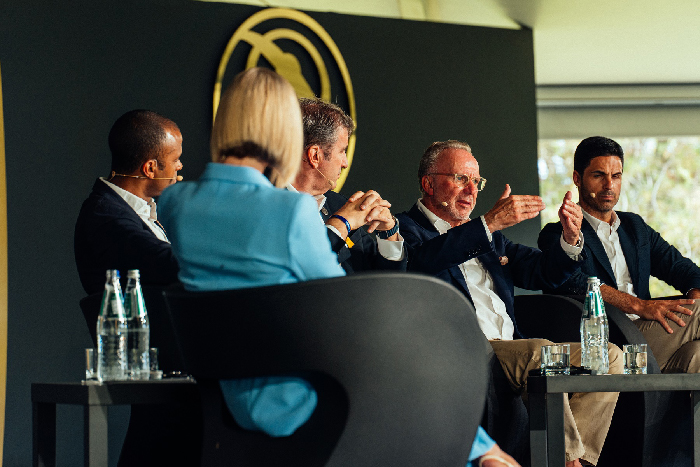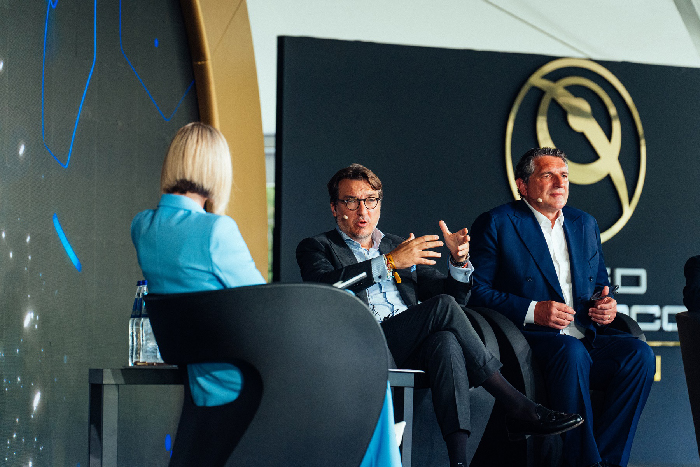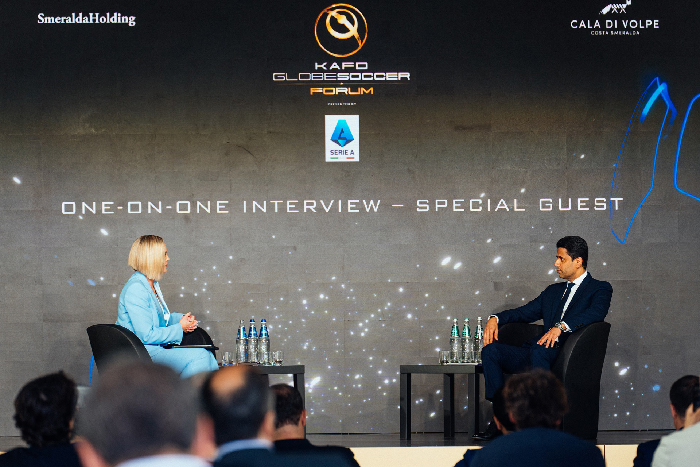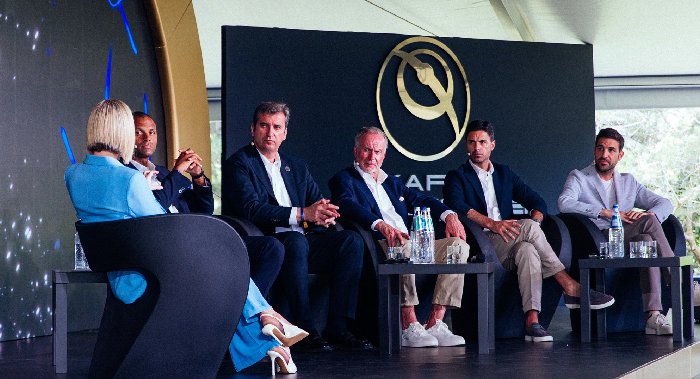Coaches, presidents, chairmen, and CEOs of some of Europe’s most prominent clubs and organisations gathered on Wednesday in Sardinia for the Globe Soccer Forum hosted by Italy’s Lega Serie A and held in partnership with Smeralda Holding. During the five-hour Forum, the continent’s key decision-makers discussed some of the most prominent issues facing the beautiful game, including financial sustainability, multi-club ownership, and the sport’s ever-growing, ever-crowded calendar.

Taking place at the five-star Hotel Cala di Volpe in Costa Smeralda, a fireside chat with Nasser Al-Khelaifi, Chairman of the European Club Association and President of PSG, separated three exploratory panel sessions featuring the likes of Arsenal manager Mikel Arteta, President of the Italian Football Federation, Gabriele Gravina, and CEO of City Football Group, Ferran Soriano.

The opening session of the day, entitled “SOS Football”, featured Gravina alongside Quico Catalán, Vice President of LALIGA, and Luigi De Siervo, CEO of Serie A, as they discussed the diversification of financing among European clubs. The three agreed that moving away from focusing solely on sponsorships and media rights and instead tapping into other ways to generate income is crucial, such as – in the case of Serie A – developing stadia so they host not only 40-50 matches per year, but can transform into arenas for other entertainment purposes. Yet it is not always as easy as it may appear.

“The problem is not investment, it is that Italy is a very bureaucratic country with lots of red tape,” said De Siervo. “You are seeing how Paris is transforming for this summer’s Olympic Games; we need a commissioner who can help the owners extend the time visitors stay in the stadium, so they stay an hour and a half before and after the game. That alone would lead to higher revenue that would allow us to grow. Football is at the core of Italian culture, but we need the Government to help us – it is very hard to take decisions in our country.”

Later, Al-Khelaifi, who collected the Football Leadership Award at Tuesday night’s inaugural KAFD Globe Soccer Awards Europe, spoke of a change in vision for PSG, including a new strategy where the collective takes priority over star players. PSG reached the semi-finals of this year’s UEFA Champions League before losing to Borussia Dortmund, yet Al-Khelaifi said winning Europe’s biggest prize was not the goal for this year.
“At the beginning of the season, I never put the objective to be even in the semi-final,” Al-Khelaifi said. “We are building a new team with a new vision, and a new cycle for PSG also. Of course, I want to be in the final and, of course, I want to win it. We won all the trophies except the big one – we were so close, just two matches away – but that is making it even more beautiful for when we do win it.”
The Qatar-born chairman elaborated on the new strategy, which moves away from the Paris club being home to some of the world’s biggest stars such as Lionel Messi, Neymar, and Kylian Mbappe, and instead focuses on the collective. The star of the new PSG, he says, is the team.
“It’s not about the players, it’s about the team,” Al-Khelaifi added. “Today, a journalist asked me who will be our star next season and I said ‘it’s the team; the collective team’. That is our vision, our ambition, and our strategy. Today the boss is the coach. Luis Enrique is the boss, I trust him, he is doing an amazing job and even if we were knocked out in the group stages, I would say exactly the same. I know – and I knew – we are on the right track. It’s not about results – even next year, the objective of course it is to win, but really it is to do the best we can and continue building.”
The penultimate session, which included both Arteta and Como assistant coach Cesc Fàbregas, as well as Soriano, Maheta Molango, CEO of the Professional Footballers Association, and Karl-Heinz Rummenigge, was entitled “Time to Play” and focused on player welfare and the crowded calendar. Next season’s calendar will be busier than ever with a revamped and expanded UEFA Champions League running from September until May and a new, month-long FIFA Club World Cup taking place in the United States during June and July.
Fabregas, as the most recently retired player within the speaker group and thus the most affected by the ever-increasing number of games players are being asked to play each year, admitted that even though he suffered increasingly more frequent injuries later in his career, he accepts players still want to play as many matches as they can rather than training. Arteta, however, raised the issue of mental health, saying that while medical machinery can advise on physical injuries, when it comes to psychological exhaustion, it is more difficult to measure.
“We forget that we are only counting acute injuries, muscle injuries, that keep a player out of for three weeks, six weeks, etc – that’s very easy to diagnose with an MRI scan,” Arteta said. “The problem we’re going to have is that one day that player is going to say: ‘I’m not fit to play because mentally I’m not in the right condition’. You cannot put that player into an MRI scan; so the doctor is going to have to decide whether that player is available to play the next week or in three months. When we have a few of those cases then what happens, because this game belongs to the players? This can happen one day and that’s my biggest worry. It is not just an injury of two weeks, but a much bigger problem that we can face in the future if we continue this way.”
The final session of the day – “Multi-Club Ownership” – saw Soriano joined onstage by Mario Malave, co-CEO of Mercury/13, and Lina Souloukou, CEO of AS Roma, whose majority shareholders recently acquired French side Cannes. The trio discussed the multi-club ownership (MCO) model, how it may evolve over the coming years, and where opportunities still exist. With more than 300 clubs around the world belonging to the MCO structure and one third of these clubs operating in Europe, the net is being cast wider than ever, said Souloukou.
“The European market is for many reasons very attractive,” she said. “At the same time, the game is developing in different directions. The women’s game is a very important component and it is still just starting really. In Italy, only three or four years ago, it wasn’t even professional, now in many soccer schools, we see the same number of girls as boys. So that is a huge opportunity. But also developing markets such as the United States, the appetite is also very high. I truly believe eventually it will be very global and the more diversity you have, the more value you’re going to create.”
The Globe Soccer Forum was hosted by Italy’s Lega Serie A and held in partnership with Smeralda Holding, owner of Hotel Cala di Volpe.
The inaugural European edition of the Globe Soccer Awards was sponsored by the King Abdullah Financial District (KAFD), a major financial hub in Riyadh, Saudi Arabia, and produced by Filmmaster (filmmaster.com). Italpreziosi and Serie A were Platinum sponsors, alongside Gold sponsors Silversands, Azimut Yachts, Socios.com, EMC Sports News, and Azura. Capichera, Smeraldina, and Belvedere Vodka were official technical partners.


COMMENTS